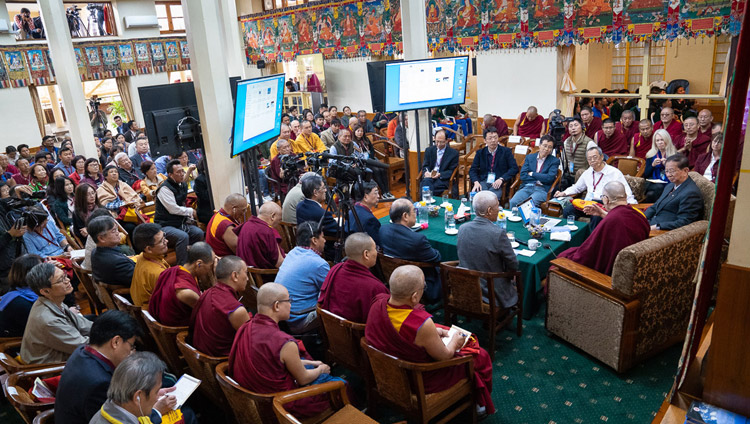
Photo: Ven Tenzin Jamphel
His Holiness the Dalai Lama has hosted the first conference with Chinese scientists to discuss the role of the Quantum Effect as it applies to both scientific and Buddhist views. The conference was held at Tsuglag Khang Temple in McLeod Ganj from November 1 – 3 and was organised by the Dalai Lama Trust.
His Holiness said there were two purposes of the meeting, namely to expand our knowledge and, secondly, to look at the use to which knowledge is put. Citing the example of scientific research producing weapons of mass destruction, he said that such destructive developments provoke fear – their development may have been a remarkable achievement, but their only purpose is to kill. The meeting also looked at ways to achieve global sustainability.
His Holiness has been meeting scientists from around the world for the last 30 years and felt a conference with mainly east Asian scientists would be appropriate and meaningful “given the religious and cultural proximity shared by the two peoples”.
The panel for the Quantum Effect dialogue consisted of His Holiness, Nobel Laureate Professor Yuan Tseh Lee and a group of nine well established Chinese scientists, most of whom were from Taiwan. Also in attendance were approximately 50 other Chinese scientists, researchers and scholars, together with 270 Tibetan researchers, Men-Tsee-Khang students and students from other Tibetan educational institutions.
While current relations between China and Tibet are strained, His Holiness gave historical examples of when these two cultures held close ties. He explained his belief that Chinese and Tibetans can benefit from each other, saying that the Chinese can benefit from the Tibetans’ preservation of Buddhist knowledge, and Tibetans can benefit from the Chinese in material and economic ways. His Holiness once again asserted his wish for Tibet to remain within the Peoples Republic of China, with full autonomy for the Tibetan people.
Throughout the conference, His Holiness expressed the importance of cultivating knowledge of emotional hygiene as well as that of physical phenomena. At one point during the dialogue, Dr Yueh-Nan Chen asked His Holiness “if his understanding of quantum physics helps his meditation.” His Holiness replied, “My daily practice is to meditate on emptiness, and altruism as well.”
Prof Maw-Kuen Wu asked for an explanation of how His Holiness understands the way things evolve from space. His Holiness answered, “When we talk about empty space, we have to get a clear perspective on the context. There’s a lot of space here in this room, for example. There are also many particles here. At an atomic level, each atom occupies space. How empty space fulfills its role is complicated. Particles have space to move around and they can even bump into each other. In the quantum physics presentations we’ve heard, we’ve focused on the physical world. Now we also have to focus on the inner world, paying more attention to mental consciousness.”




 Print
Print Email
Email